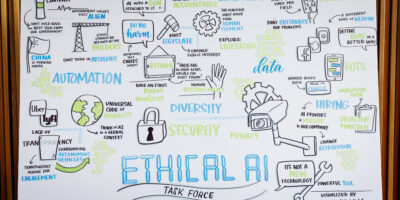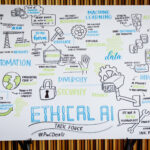
(Photo by Dimitar DILKOFF / AFP)
Done right, human ethics can ensure AI bias is curbed
AI bias continues to be a prevailing problem when it comes to ensuring proper implementation of artificial intelligence (AI) in many industries. Since the technology has been implemented across several verticals, some of its use cases have been causing… unpleasantness among users.
One of the biggest worries surrounding the sticky issue of AI bias, is in facial recognition solutions. As AI works purely on analyzing data inputs that it has access to, the algorithms may at times not provide entirely accurate results. In the case of facial recognition, the particular AI recognized certain races as criminals, causing an uproar in society. More recently, AI chatbots have also been spotted making mistakes, providing wrong and in some cases, vulgar replies to certain queries.
In the second part of our interview, Seth Dobrin explains how businesses can deal with AI bias.
Can ethical AI help overcome AI bias?
Companies still have a way to go as far as ensuring their AI and the results are carefully audited, maintained, and improved. AI for example is not great at making predictions about once-in-a-generation or once-in-a-lifetime events, like a global pandemic or a record-breaking wildfire – if something has never happened before it’s not going to be reflected in the data – so there needs to be significant human intervention to refine AI and make it helpful.
To support bias mitigation strategies, businesses should work to create and put into practice AI ethics guidelines, and ensure appropriate governance is in place to provide ongoing review and oversight of AI systems. When done right trustworthy AI can counter our human biases and ensure fairer outcomes for decisions that matter — employment, health, and wealth.

(source – IBM)
There is also a necessary and appropriate role for government policy to establish clear guidelines and promote ethical and trustworthy behavior. IBM’s call to action on Precision Regulation is clear: it is essential to strengthen trust without stifling innovation or limiting AI’s potential to help us make the world smarter, healthier, and more sustainable.
Across ASEAN, we are seeing efforts which are underway to better understand and address legal, moral, and ethical issues raised by the spread of AI systems and services across economic sectors.
For example, in Malaysia, the AI guidelines were set by the central bank in its eKYC (Electronic Know Your Customer) policy in June 2020. We also saw Thailand’s Digital Economy and Society Ministry draft the country’s first AI ethics guidelines, ensuring that technology takes into account equality and fairness. In parallel, Singapore is working with the industry to leverage AI responsibly, and launched the MAS-Veritas initiative framework last year. IBM is engaged with government officials worldwide as they explore the critical questions posed by the advancement of AI.
We believe blanket bans of new technologies would irresponsibly slow innovation, but that focusing regulatory effort on use cases with a high risk of societal harm allows for necessary course correction without hindering the benefits that AI can deliver. IBM’s global call to action on “Precision Regulation for AI” outlines a risk-based framework for industry and governments to work together in a system of co-regulation.
Where does IBM draw the line when it comes to ethics in AI?
IBM’s AI Ethics Board embeds our established ethical principles throughout our global operations — and it has helped create a culture of technology ethics. It provides two-way engagement, promotes best practices, conducts internal education, and leads our participation with stakeholder groups worldwide.
It is one mechanism by which IBM holds our company and all IBMers accountable to our values, and commitments to the ethical development and deployment of technology. Through this group’s work, IBMers at every stage of AI development and deployment are invested in ensuring the technology is designed and used responsibly.
How businesses can implement ethical AI?
One example I can describe is our work with Regions Bank to transform its advanced analytics using modern tools, and new open and transparent methodologies. Regions Bank faced the challenge of having an advanced analytics practice that too often relied on siloed data sets, development teams working in isolation, and disparate and somewhat inconsistent development methods.
To meet this challenge, we worked with Regions Bank to create an analytics Center of Excellence to help bring data into a centralized environment, applied more machine learning and AI techniques, and, above all, adopt an end-to-end business value approach that includes AI quality control.
The results are trusted analytical solutions, built with IBM Cloud Pak for Data, that gave Regions Bank a continuous read on model accuracy using monitor alerts in production, helping them achieve higher confidence in the quality of predictions and further their end-to-end lifecycle management approach — accelerating development of the high quality, trustworthy AI solutions that Regions Bank strives for.
READ MORE
- The criticality of endpoint management in cybersecurity and operations
- Ethical AI: The renewed importance of safeguarding data and customer privacy in Generative AI applications
- How Japan balances AI-driven opportunities with cybersecurity needs
- Deploying SASE: Benchmarking your approach
- Insurance everywhere all at once: the digital transformation of the APAC insurance industry


